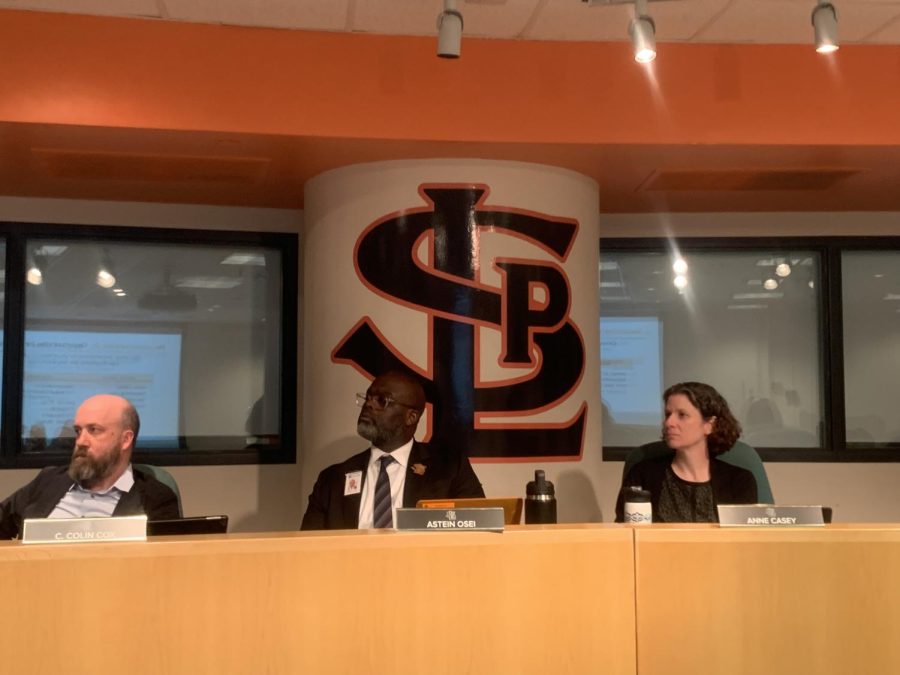Under the surface of budget cuts
How budget cuts and increases in funding impact school spending
Superintendent Astein Osei at school board meeting April 25. The school board is planning the budget for upcoming 2023-2024 school year.
April 27, 2023
While still in recovery from the COVID-19 pandemic, Park, like many other school districts in the state, is facing budget cuts.
Even as the state legislature moves to increase funding for schools, the Park School Board has to cut the budget for the upcoming school year to maintain its financial stability.
Director of business services for Park, Patricia Magnuson, said inflation is a major factor in fueling budget cuts.
“Most of our revenue is connected to the number of students,” Magnuson said. “Our enrollment numbers have been flat, but that doesn’t mean expenses are flat. The fact is, we haven’t added things to the district’s footprint, but costs continue to rise at rates of 5% or more.”
Representative Larry Kraft said Minnesota schools have been getting less funding over time, and in the long run schools suffer the consequences.
“If you look at how much funding schools have gotten, looking back about 20 years, it hasn’t been changing with inflation,” Kraft said. “It works out to a gap of around $1,000-per-student now, and because schools get funding based on the number of students, we’ve been really defunding or disinvesting in education.”
A bill was introduced to the Minnesota House of Representatives in early 2023 to increase the school funding formula by 5% next year, then tie future increases to inflation. Superintendent Astein Osei said the possibility of increased funding will affect the budget for the coming year.
“We are mindful of what’s happening at the legislative level,” Osei said. “For the current budget, we made an assumption the funding formula would increase by 2%, which is more of a conservative assumption, recognizing that right now, there’s talk about up to 5%. There’s going to be an opportunity to utilize additional funding to bolster some of our reserves and also professional development for educators, particularly around literacy.”
Kraft said he’s confident about the potential capabilities of the funding developments.
“I’m optimistic that we’ll be able to make things a lot better in terms of education funding,” Kraft said. “It’s not going to fix it all. There’s a lot of work to be done. I’m hopeful that we’re going to be able to address some of these (funding) gaps.”
Magnuson said that increased funding will have a negligible effect on the budget for the 2023–24 year, and meanwhile the most fiscally responsible thing to do is create a budget that doesn’t rely on an uncertain increase in funds.
“If we say, ‘Let’s not cut anything,’ revenue will go up and expenditures will go right into it,” Magnuson said. “We’re trying to be good stewards of public funds so don’t have this whiplash effect of budget cuts every single year.”
Student intern for the Finance Advisory Committee (FAC) Alicia Margalli shared how her feeling of confusion and disdain for budget decisions changed while working as an intern on FAC.
“I would see things going on at the school and I’d be frustrated by it because I never really knew how the financial part of the school works,” Margalli said. “(Being an intern has) definitely given me a new perspective to be more lenient and trust the people who are in charge of the financial advisory committee.”
According to Osei, there are many factors that impact the direction of the school’s funding — one of those being Post-Secondary Education Opportunities (PSEO).
“As a school district, we receive state funding per student,” Osei said. “When students engage in PSEO in partnership with whatever school, we pay a portion of that student’s per-pupil revenue to that educational institution. There’s this belief that, ‘Maybe you shouldn’t have PSEO options because you’re losing money.’ It’s not as simple as, ‘PSEO is bad.’ It’s a tremendous benefit for students and families. Any school district would be wise to have that as an offering.”
Recently, a Minnesota law was passed that grants free school breakfasts and lunches to students in every public and charter school across the state. Magnuson said the new law affects a different part of the budget than where cuts are targeted, so it will have virtually no effect on budget cuts.
“It starts next school year, and school nutrition is separate from the general fund,” Magnuson said. “We cannot use school nutrition funds to supplement the general fund. The free meal program will just replace what families pay for the pattern meals with state funding to cover the costs, so it really is separate from the general fund and shouldn’t have an impact.”
While a myriad of elements contribute to upcoming budget cuts the School Board, in conjunction with the FAC, is trying their best to balance these cuts while minimizing the effect on students, according to Margalli.
“Obviously, budget cuts aren’t a positive thing, but we have people in the Financial Advisory Committee who truly understand how it affects students and teachers,” Margalli said. “We are making sure it’s not going to negatively affect students and teachers as much.”





